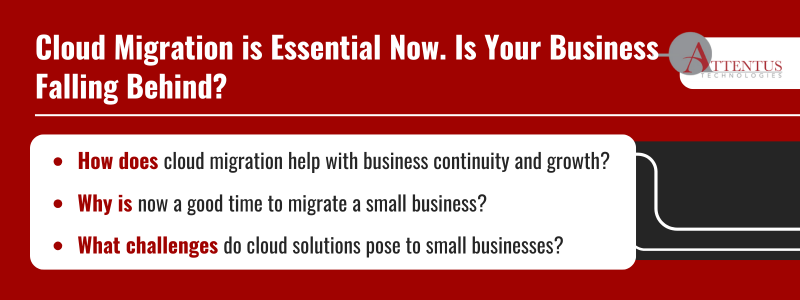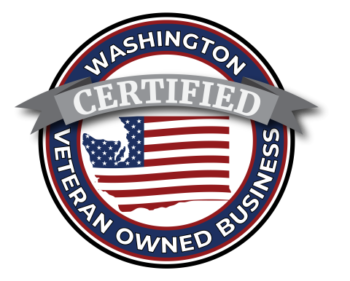In a rapidly changing market, can you really afford to ignore your outdated systems and sacrifice security, cost-efficiency, and competitiveness?

If you’re still managing all your I.T. needs in-house, you may be losing ground to the competition. In today’s fast-evolving digital market, small businesses must migrate to the cloud more than ever to stay competitive, secure, and cost-efficient.
A well-thought-through strategy for small business cloud migration can enhance business continuity, scalability, and resilience. However, ignoring the advantages of the cloud or adopting a defective strategy can lead to frustration, delays, and stymied opportunities.
Critical steps for cloud migration success can include:
- Assessing your current I.T. infrastructure
- Thoroughly planning a migration with a checklist
- Undertaking the migration according to your plan
- Continually optimizing the cloud setup to receive full benefits
Is Your Small Business Unnecessary Facing Challenges Without Cloud Solutions?
Small businesses that don’t embrace the benefits of cloud migration are often limited by their legacy on-premises infrastructures, which often feature high maintenance costs and vulnerability to security breaches and data loss. Here’s what can happen without cloud integration:
- Difficulty supporting remote work and collaboration, limiting productivity
- Increased risk of service outages due to reliance on on-premises infrastructure
- Limited flexibility to scale resources up or down as needed
Businesses that decide to migrate often encounter implementation challenges like unexpected costs, data synchronization issues, and training gaps. To prepare, partnering with a managed services provider (MSP) experienced in cloud migration can ensure a smooth transition.
Benefits of Cloud Migration For Small Businesses
With a sound small business cloud migration solution, you will gain enhanced flexibility and scalability and be better able to adapt to changes and respond to business growth challenges. Other significant benefits of cloud migration include:
- Lower costs for resources, maintenance, and real estate
- Reliable backup and recovery processes to protect data
- More robust security to safeguard against cyber threats
- Simplified management and real-time monitoring
- Access to cutting-edge tools and technologies to stay competitive
Best Practices For Successful Cloud Migration
To ensure that your small business cloud migration goes smoothly, you should follow some proven best practices, including setting clear objectives so that the process doesn’t get out of hand. These can include cost reduction, growth, enhanced security, and others.
Other best practices include:
- Prioritizing essential data and application needs
- Choosing a suitable cloud model, such as infrastructure as a service (IaaS), platform as a service (PaaS), and software as a service (SaaS)
- Thoroughly plotting out how to preserve data integrity during migration
- Encrypting data for transfer
- Adhering to industry compliance regulations
- Testing and validating data and processes to resolve issues before they damage your business
- Training your team to use new tools and processes
- Reviewing your cloud usage to identify areas for improvement
Stay Safe After Cloud Migration
Not only do you need to plan a safe data migration to the cloud, but you also need to put measures and protocols in place to keep your network secure from threats such as phishing, ransomware, malware, denial of service (DoS) attacks, and others.
So, your new software must be configured appropriately, continually updated, and patched to ensure the latest security protections. You should implement robust access controls, set up multi-factor authentication (MFA), and regularly scan your cloud resources for suspicious or threatening activities.
A migration to the cloud can enlarge your “attack surface,” with new attack entry points added with every new microservice introduced. Your plan needs to cover these new vulnerabilities. Zero-day attacks also take advantage of weak spots in commonly used cloud software that many new users simply aren’t aware of. So, these need to be fixed.
Remember that human error might be the biggest weakness in your new setup. Raising awareness and training staff to close these security gaps must be a top priority.
Post-Pandemic and Economic Environment Got You Stuck?
The pandemic started a trend in the small business adoption of digital tools, including the cloud, to survive and stay competitive. The competitive economic environment has continued the drive for cost-effective, agile solutions, leveraging cloud technologies to remain resilient and responsive.
A huge component of the post-COVID world is remote work teams, which need to collaborate effectively and access the resources of their company network as easily as if they were in-house. Not only must the connectivity be seamless and straightforward, but it must also close any security holes created by the new working methods.
How Attentus Can Simplify the Cloud Migration Process
It is more important than ever for small businesses to adopt cloud solutions to optimize their operations, save money, lay the groundwork for growth, and stay competitive in a landscape where many others are trying to do the same.
At Attentus Technologies, we have long believed that cloud computing is the future of small business I.T. Without its advantages, your company can be left coping with hardware limitations, spiraling maintenance costs, frustrated remote workers, data accessibility issues, frequent network downtime, and much more.
One of our core values is being easy to work with. This commitment helps us eliminate knowledge barriers, allowing you to benefit fully from the latest I.T. technologies.
We are dedicated to listening to our customers’ needs and working with them to develop clear solutions to their problems with the cloud or other I.T. issues. We are committed to taking the mystery out of technology so they can receive its benefits without experiencing its pitfalls.
Most importantly, we understand that your staff can often be the weakest link in your security. That’s why we prioritize comprehensive employee training as part of our approach. By equipping your team with the knowledge and tools to recognize and respond to potential threats, we transform your workforce into a strong first line of defense, ensuring your organization stays secure.
Contact us for a free consultation with one of our experts to create a seamless, strategic cloud plan to help your small business achieve its ambitions.

